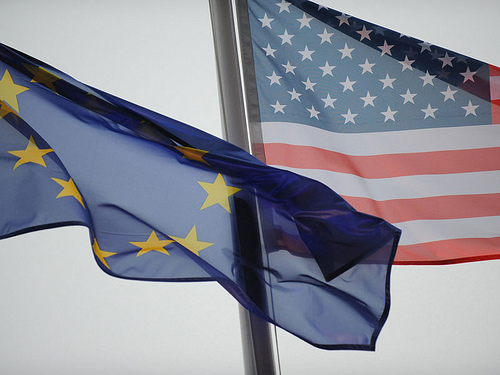
A UK Parliamentary committee report finds the EU’s Afghan police mission is "failing," and a top adviser to German Chancellor Merkel is chosen as the new head of Germany’s central bank.
HEADLINES:
Russian, U.S. Generals to Discuss Nuclear Terrorism in Lisbon (RIA Novosti)
Russian and U.S. generals are set to meet in Lisbon in June where cooperation on nuclear terrorism is said to be of special interest. The discussions are to occur during a meeting of the Elba military commanders club.
MEPs to support Egypt’s transition to democracy (EurActiv)
Five days after the fall of Hosni Mubarak, the European Parliament is today (16 February) set to deplore the EU’s weak and slow reaction to developments in Egypt. EurActiv France reports.
France Seeks Input on Euro Pact (Wall Street Journal)
French Finance Minister Christine Lagarde on Tuesday urged euro-zone members to stop criticizing a Franco-German pact aimed at boosting the competitiveness of the 17-nation currency bloc, and instead to make contributions to it.
EU diplomat optimistic on Transniestria and Ukraine (EUobserver)
Miroslav Lajcak, the EU’s top official covering post-Soviet countries and the western Balkans, has said he is optimistic about progress on the frozen conflict in Transniestria and on signing a landmark treaty with Ukraine this year.
A Replacement for Weber: Merkel Advisor Weidmann to Take Over Bundesbank (Spiegel Online)
A top adviser to Chancellor Angela Merkel has been chosen to succeed Axel Weber at the head of Germany’s central bank. Jens Weidmann is to be handed the job despite concerns from within Merkel’s coalition and in the opposition about his proximity to the goverment.
EU’s Afghan police mission ‘failing’ – UK Lords report (BBC News)
The EU’s police mission to Afghanistan is "failing" and the timetable for withdrawing Nato-led troops is at risk, a UK parliamentary committee says.
EU steps up the fight against counterfeit drugmakers (Deutsche Welle)
The European Parliament has passed a directive aimed at curbing the sale and distribution of counterfeit drugs. Barcodes and holograms are being discussed as ways to ensure products are genuine.
EDITORIALS AND COLUMNS:
Europe’s Competitive Shell Game (Project Syndicate)
For seasoned observers of Europe’s economy, the most recent European Union summit delivered a bizarre sense of deja vu. Little more than a decade ago, European leaders announced to great fanfare the "Lisbon Agenda," a policy blueprint to make Europe "the most competitive, knowledge-based economy in the world." The new "Competitiveness Pact," proposed at the EU summit by France and Germany, did not make the same pretensions to global grandeur, but was instead sold as a step required to ensure the survival of the euro.
Anchors Away: American Sea Power in Dry Dock (World Affairs Journal)
Of the twenty-one years that have passed since the United States invaded Panama to remove the military dictator Manuel Antonio Noriega, the US has been at war for fourteen. In the Balkans, Iraq, Afghanistan, Iraq again, and now Afghanistan again, we have fought and are still fighting essentially land campaigns that, in addition to having indecisive outcomes, have transformed our idea of military deployment from the traditional balance of sea and land strengths that sustained American foreign policy in the twentieth century to a mixture of counterinsurgency efforts (which include training others in counterinsurgency), constabulary operations, and nation building. These ground-based operations reflect and reinforce the United States’ unarticulated drift toward a national security strategy that sometimes looks like a grand Whac-A-Mole game. US military attention, for example, is at present most alert and concerned about the possibility that Yemen and nations in the nearby Horn of Africa will be added to the list of disintegrating states that al-Qaeda and other groups can use as bases for terror. These too will become candidates for interjecting American land forces.
Compiled with the assistance of Klee Aiken.
Image: transatlantic.jpg
